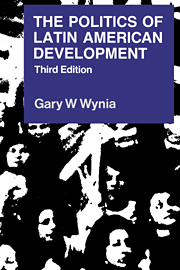Book contents
- Frontmatter
- Contents
- List of maps and tables
- Preface to the third edition
- Preface to the second edition
- Preface to the first edition
- Map 1 Latin America
- Map 2 Per capita gross domestic products 1987, measured in 1986 U.S. dollars. (Source: Inter-American Development Bank, Economic and Social Progress in Latin America, 1988, p. 540.)
- Part I Understanding Latin American politics
- Part II The political games played in Latin America
- Appendix: Tables
- Index
Preface to the third edition
Published online by Cambridge University Press: 20 October 2009
- Frontmatter
- Contents
- List of maps and tables
- Preface to the third edition
- Preface to the second edition
- Preface to the first edition
- Map 1 Latin America
- Map 2 Per capita gross domestic products 1987, measured in 1986 U.S. dollars. (Source: Inter-American Development Bank, Economic and Social Progress in Latin America, 1988, p. 540.)
- Part I Understanding Latin American politics
- Part II The political games played in Latin America
- Appendix: Tables
- Index
Summary
I have tried to make this edition more instructive than its predecessors. I rewrote the “president's report” in the first chapter so that it better addresses current issues. There is also new material in Part I on the foreign debt issue, the Roman Catholic Church, and the armed forces. But, as might be expected, most of the revising was done in Part II. All of the national cases have been brought up to date, with special attention given to the restoration of constitutional democracies in countries that were previously governed by their armed forces. I have also added more information and analysis on Cuba and Nicaragua.
Anyone familiar with the second edition will notice that I have reorganized Part II. In this edition I begin with Mexico because in my own teaching I have found it to be a provocative starting point for students, all the more so after the 1988 elections and the questions they raised about political change. I have also joined previous chapters on populism with those on military authoritarianism in Brazil and Argentina, to facilitate more systematic comparisons of those nations' movement to authoritarian government and from it, recently, to democracy.
- Type
- Chapter
- Information
- The Politics of Latin American Development , pp. xi - xiiPublisher: Cambridge University PressPrint publication year: 1990

